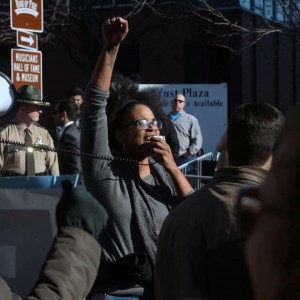
So once you’ve had a real internal conversation about why, and followed that up with conversations with folks in the movement, especially other movement attorneys, and have made the commitment, what are other questions to consider? Here’s a few to get you started:
1) Where should I put down roots?
Well, let’s be real, I’m biased here (#ORGANIZETHESOUTH), but what I can say without question is that there are places where movement lawyering infrastructure barely exists or doesn’t exist at all: places in the Deep South. Places in Appalachia. Places in the up[per] South/Midwest. There are so many folks whom, with your skills and practices, can benefit from the knowledge you have. Movements could tangibly change people’s material conditions for the better because you’re there to flank them. It’s also real that choosing to come into an area that you’re not from or haven’t lived in comes with the responsibility to be even more aware of how your presence impacts that community. You’re coming into relationships, community building, struggle, organizing and activism already in progress. Being an expert on the law doesn’t equate to being an expert on what solutions make the most sense to folks who have been oppressed by these corrupt systems and building community in a neighborhood for generations. It’s important to come into movement work, whether as an attorney or as a activist/organizer, with a level of humility, to share information knowing that the community might choose to utilize other tactics and strategies, and a commitment to follow principled leadership of the folks who are most directly impacted by the work you’re doing (whether you always agree or not). Considering location is critical to successfully showing up as a movement attorney.
2) What’s my role?
Listen. I’m sure that for years you’ve been taught that your job is to close a case as quickly as possible, sometimes with the most easily digestible legal conclusion. I know that movement people, their tactics and strategies, can seem totally out of line with what you’ve learned makes the most sense when it comes to law and policy. I. Feel. You. Know that if you’re deeply rooted in community, that your input might be valuable and helpful. Also know that your primary role as a movement lawyer is to support the team: to make sure folks can safely stand up for justice and liberation, to make sure that when folks get locked up they’re safe, to support movement in the implementation of their strategy. That might sometimes be really frustrating for you. Build a community of movement attorneys around you who can support you in those moments and keep on serving the people.
3) Who do I represent? What cases should I take on?
We’re seeing more and more attorneys pull away from cases in which the client isn’t perfectly squeaky clean (based on the state, media, oppressive structures description). It is so important, as a movement attorney, to seriously consider what it means for you to say no when the family of a person murdered by police asks for your representation, even if the victim had a record or a weapon. Or when a worker with an attitude comes with a serious grievance against their boss. Whatever the case may be, if you really believe in movement, and if you really believe that everyone deserves justice, you’ll step out there with the most marginalized in our community and trust movement and the community to have your back because they do.
The most important thing is to show up for the movement, for the community, and to show up consistently. Ask questions before offering judgment. Serve the people. Join or build a community of likeminded attorneys and trusted movement leaders who you can go to for support and with whom you can mobilize. It’s a hard job, but you just might have been called to do it. We need you.
Ash-Lee Woodard Henderson an Affrilachian (Black Appalachian), working class womyn, from Southeast Tennessee. She is a organizer with Concerned Citizens for Justice in Chattanooga, TN, plays an active leadership role in the Movement For Black Lives, a board member of the Highlander Education and Research Center, and the Regional Organizer at Project South: Institute for the Elimination of Poverty and Genocide based in Atlanta, Georgia.




